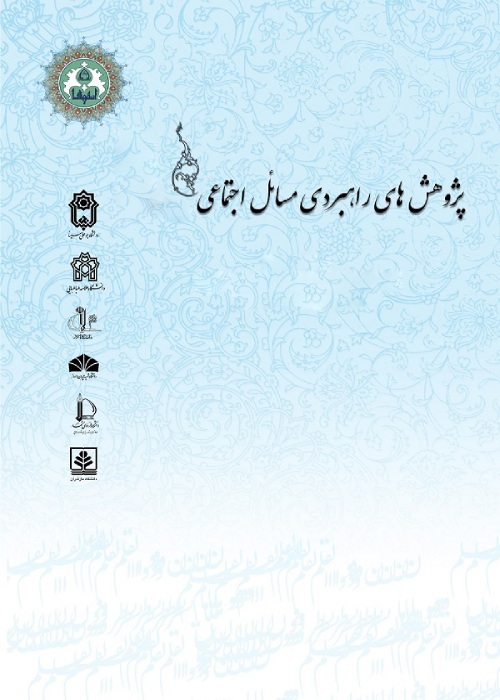Developing a Model for Social Capacity Building and Water Crisis Socialization
Population growth, climate change, urbanization and diversification of water use, mismanagement of water resources along with the degradation of the environment have put great pressure on the limited available water resources. Competition over limited water resources has also led to widespread debate in the field of water to date, which has been called the status of water resources beyond the water crisis and even water bankruptcy in Iran. In such circumstances, it seems that the primary precondition for successful management of the water crisis is the socialization of the issue with the socialization of individuals on water issues. Environmental socialization is a relatively new topic in the field of sociological studies, which means that to what extent institutions and factors of socialization, such as family, school, peer group, institutions, media, etc. can influence people's attitudes, worldviews and ultimately their behavior, and institutionalize and internalize environmental values.
The purpose of this study is to provide a strategic pattern for social capacity building and citizens’ socialization towards water crisis issues. For this purpose, in the qualitative paradigm, based on Grounded Theory Methodology, Strauss and Corbin's systematic approach has been used. Also, 33 deep and semi-structured interviews were conducted using theoretical sampling and further snowball techniques with experts in the water, social and communication sciences and media. In order to assess the validity of the interviews, interpretations of the interviews were made by self-assessed interviewees and, at the end, a summary of the pattern was presented to several of the professors and their comments were accepted for modification.
The main issue of the research was called the ‘Social Capacity Building’. The causal conditions of socialization toward the water crisis were: academic and educational weakness, lack of expertise, non-commitment in responsibility, failure to empowerment public opinion, distrust, concealment and gatekeeping, lack of media democracy, inappropriate media policy, social dissatisfaction, low social capital, the transition from tradition to modernity and low communication. Also, research strategies include creating private media, building trust, promoting social capital, socializing the water crisis and increasing demand, creating a dialogue of water and the renewal of the culture of water dignity, interacting with the media, creating a system of encouragement and punishment, increasing training and water literacy, science-centered approach, using media tactics, selecting effective media, establishing effective communication all were resulted from three stages of coding. The non-socialization and non-institutionalization of water value as contextual conditions and the diversity of audiences as confounding conditions were also obtained. Thus, the positive consequences of the socialization of the water crisis were: increased water literacy, a central community of water discourse, and compliance with conditions. The negative consequences were the lack of socialization of the water crisis, the lack of social participation, and the spread of controversial rumors. Iranian people live in a dry and semi-arid country that has always had problems supplying water in some parts of the country, however, the study shows that Iranian behavior is not in line with popular behavior in a water-scarce country. Resources and consumption in the country are inconsistent. Now that the country is facing a severe water crisis, the need for socialization of the water crisis and socialization of the crisis by the people is urgently needed. In fact, the findings of the study indicate that the water issue is not posed a socio-natural crisis in the society, and this is determined by the data-driven conditions in the paradigmatic model. One of the important aspects of socialization is media. Since the media have a powerful voice role for all people and people spend a lot of time on them, so they are at the forefront of societal factors (Gill & Adams, 2005: 90-98). All participants in the study believed that the media in Iran did not succeed in socializing the water crisis. And people have not received enough training in this field. Strengthening media and communication dimensions is one of the key points in these findings. Early childhood education and the creation of a water discourse through effective dialogue about water in the community is strongly recommended with the help of social facilitators and restoring lost public confidence to increase their participation. It is also about revitalizing water culture and institutionalizing water value in the society and turning it into a social issue alongside technical solutions to ways out of crisis.
- حق عضویت دریافتی صرف حمایت از نشریات عضو و نگهداری، تکمیل و توسعه مگیران میشود.
- پرداخت حق اشتراک و دانلود مقالات اجازه بازنشر آن در سایر رسانههای چاپی و دیجیتال را به کاربر نمیدهد.


